#Video Distribution Service
Explore tagged Tumblr posts
Text
How Content Marketing Works?
Introduction:
Content creation & marketing has been a core part of Marketing for a long time. But what many people get wrong when creating a content marketing strategy is Storytelling!
Storytelling can be the difference between marketing that is impactful and something which is just another Ad on social media.
Needless to say, storytelling is not the only thing that is important for content marketing, there are many things that one has to determine when creating their content marketing strategy. Target audience, brand voice, consistency, quality, brand colours, type of content etc. In this article we’ll look at the needs & ways to create a content marketing strategy that works best for your brand & business.
Why do you need Content Marketing?
Content Marketing is the process of creating & distributing various types of content like videos, articles, social media posts, blogs etc. to attract the attention of your target audience, spread awareness about your brand & convert the same audience into loyal customers.
Content marketing has been around since old times. From the town crier selling newspapers in the city square to the pop-up ads that you see after visiting a website. The most visible difference is the priority given to the way we market our content today.
Research shows that businesses with blogs get 67% more leads & 67% marketers claim to have seen an increase in leads due to B2B content marketing.
With the current algorithms of social media platforms which pushes short video content, Instagram reels & Youtube shorts have shown to be nearly 88% more effective when included in content marketing plans.
Benefits of Content Marketing:
Online Visibility
Better Lead Generation
Customer Loyalty
Creating a Content Strategy from Scratch
To be able to take full advantage of content marketing one needs to prepare a well researched strategy. A usual content marketing strategy consists of the following:
Goals & KPIs
Determining Target Audience
Content Research & Type
Distribution Channels
Re-evaluation & Optimizations
SEO’s role in Content Marketing
SEO or Search Engine Optimisation is the king of marketing your content organically to your target audience. Thus, it is imperative to optimise your content as per the latest SEO standards set by search engines like google chrome, firefox etc.
It is also important to make sure that you:
Avoid keyword stuffing
Use relevant & specific keywords
Optimise meta-tags & description properly
Content Marketing using A.I

Content Marketing is no exception to this, with A.I you can boost your work efficiency in many stages of your plan, such as:
Automated Creation
Personalisation
Predictive Analysis
Evaluation & Measuring your Success
Understand that marketing is a never-ending process. This is because the factors that drive the market & the customers are always changing. Thus, making it detrimental to your content marketing efforts.
Measure your content’s marketing effectiveness by:
Tracking Engagement Metrics
Monitoring Website Traffic
Lead Generation
Social Shares
SEO Performance
#contentmarketing#content marketing strategy#digital content marketing#content creation services#B2B content marketing#social media content marketing#content marketing tools#content marketing trends#content distribution#what is content marketing#content marketing examples#content marketing for SEO#content optimization#SEO content creation#content marketing keywords#blog content marketing#video content marketing#email content marketing#infographic content marketing#long-form content#interactive content marketing#content marketing ROI#content engagement metrics#organic content growth#traffic through content marketing#lead generation through content#content marketing for small businesses#content marketing for e-commerce#healthcare content marketing#SaaS content marketing
1 note
·
View note
Text
I personally think posting about barbershop groups as if they are your new favourite kpop b/g-group would be really fucking funny.
#barbershop quartet#can you imagine#wheres my fancam edit wheres my barbershop fan service#wheres my line + screen time distribution video (its fucking equal because its 4 part harmonies and theyre all on stage at the same time)#stream their newest set please we can pass 2k view this time gang promise#be so fr whos your barbershop bias
1 note
·
View note
Text
youtube
Revolutionize Your Podcast with Podcastle AI
Explore the transformative impact of generative AI in podcast creation with us! This video delves into how AI technologies are revolutionizing the industry by automating content creation, enhancing audio quality, and personalizing listener experiences. We’ll discuss tools like Podcastle's clip generator and revoice feature that streamline workflows for podcasters and content creators.
Discover advanced methods for improving production processes, from AI-driven transcription services to programmatic podcast advertising. These innovations not only enhance accessibility but also help monetize content effectively. Join us as we uncover these exciting developments in media production!

Podcastle AI:
Explore the transformative impact of generative AI in podcast creation with us! This video delves into how AI technologies are revolutionizing the industry by automating content creation, enhancing audio quality, and personalizing listener experiences. We’ll discuss tools like Podcastle's clip generator and revoice feature that streamline workflows for podcasters and content creators.
#Youtube#Podcastle#Generative#Aritificial Intelligence#AI#Neturbiz#Revolutionizing Podcasting#Content Creation#AI Integration#Media Production#Innovative Solutions#Tech-savvy Creators#Streamline Workflows#Content Quality#Advanced Methods#Audio Distribution#Revoice Utility#Clip Generator#Social Media Promotion#AI Video Editor#Transcription Services#Programmatic Advertising#Audio Enhancement#Background Noise Reduction#Content Creation Tools#innovations#Technologies
1 note
·
View note
Text
Music Distribution Service | SYRO Digital
Music Distribution Service
SYRO Digital is a leading music distribution service that offers musicians and artists the opportunity to distribute their music to a wide range of online platforms. With the rise of digital streaming and downloading, it has become increasingly important for musicians to have their music available on popular platforms such as Spotify, Apple Music, and Amazon Music. SYRO Digital provides a seamless and efficient way for artists to get their music to these platforms and reach a global audience.

One of the key benefits of using SYRO Digital as a music distribution service is the convenience it offers. Instead of having to navigate the complicated process of submitting music to each individual platform, artists can simply upload their music to SYRO Digital's platform and let them handle the distribution process. This saves artists valuable time and allows them to focus on creating and promoting their music.
In addition to convenience, SYRO Digital also provides artists with detailed analytics and reporting. Once the music is distributed, artists can access real-time data on how their music is performing across various platforms. This includes information on streams, downloads, and revenue generated. Having access to this data allows artists to make informed decisions about their music career and marketing strategies.
Furthermore, SYRO Digital offers competitive pricing packages that cater to artists of all levels. Whether you are just starting out or have an established fan base, there is a package that suits your needs. This flexibility ensures that artists can choose the best option for their unique circumstances and budget. Overall, SYRO Digital is a reliable and efficient music distribution service that can help artists maximize their reach and potential in the digital music landscape. With its convenient platform, detailed analytics, and competitive pricing packages, it is an ideal choice for musicians who want to take their music to the next level. By partnering with SYRO Digital, artists can focus on what they do best - creating amazing music - while leaving the distribution process in capable hands.
1 note
·
View note
Text
Unlocking Success: Mastering Strategic Ads Bidding with HS Digital Media
In the dynamic realm of digital advertising, the key to unlocking unparalleled success lies in strategic ads bidding. At HS Digital Media, we’re not just a service provider; we’re your strategic partner, committed to maximizing the impact of your Google Ads campaigns. Let’s dive into the world of strategic ads bidding and how our Google Ads services can elevate your online presence.

Strategic Ads Bidding: The Powerhouse behind Campaign Success
1. Precision in Every Bid:
In the vast landscape of online advertising, precision is paramount. Our strategic ads bidding approach ensures that every bid is meticulously calibrated to align with your campaign objectives. Whether you’re aiming for increased clicks, conversions, or brand visibility, our bidding strategies are tailored to your unique goals.
2. Real-time Adjustments:
The digital landscape is ever-evolving, and so are consumer behaviors. With our real-time bidding adjustments, we keep your campaigns agile and responsive. This adaptability allows us to capitalize on emerging trends, ensuring your ads are always at the forefront of your target audience’s attention.
3. Maximizing ROI:
Your advertising budget is a valuable resource, and we understand the importance of maximizing every dollar spent. Through strategic bidding, we optimize your return on investment (ROI), ensuring that your ad spend translates into tangible results and a measurable impact on your bottom line.
HS Digital Media’s Google Ads Services: Elevating Your Online Presence
1. Targeted Keyword Optimization:
At the heart of effective Google Ads campaigns is strategic keyword optimization. Our experts conduct in-depth research to identify and target the most relevant keywords for your business. This ensures that your ads are displayed to users actively searching for products or services like yours.
2. Compelling Ad Copy:
In the crowded digital space, compelling ad copy is your ticket to capturing attention. Our creative team crafts ad copy that not only aligns with your brand voice but also entices users to click and take action. We understand the art of persuasion and leverage it to drive engagement.
3. Continuous Performance Analysis:
The key to sustained success is continuous improvement. Our team diligently monitors and analyzes campaign performance, making data-driven decisions to optimize your Google Ads strategy. This proactive approach ensures that your campaigns evolve with the ever-changing digital landscape.
Your Success, Our Priority
HS Digital Media is more than a digital marketing agency; we are architects of success in the online arena. With strategic ads bidding and Google Ads services designed for impact, we are committed to propelling your brand to new heights. Join us on the journey to digital excellence. Connect with HS Digital Media today and let’s redefine your online success story.
Ad Disclaimer: Google Ads services provided by HS Digital Media are designed to optimize campaign performance. Results may vary based on various factors, and ratio may be vary
#strategic ads bidding#Google Ads campaigns#Google Ads services#Google Ads services in Mumbai#2D & 3D Motion Videos#Above the Line (ATL) advertising#Ad Film Expertise#ATL extends i#Benefits of Paid Advertising#ad film production#BTL#customized Google Ads strategy#film and tv production#Celebrity Endorsement!#Google AdWords campaign#website maintenance services#strategic influencer partnerships#reliable website maintenance services#PR Media Coordination#Media Release Distribution#Media Coordination#Films Production Services#film productions#film production process#film production house#influencer partnership#film production#Production Services#website maintenance services in Mumbai#Whiteboard Animation
1 note
·
View note
Text
Okay you know what, I do have another thing to add about audio fiction and how important it is, especially now. You know, during *gestures broadly around*
The thing about audio fiction is that they can't take it down.
Books can be pulled off the store shelves and publishers can flat-out refuse to give space to new ones that don't fit their side of the current political climate. Video streaming services can and already have gone even further by entirely scrubbing media they don't like from the only places that had rights to distribute them -- if not for piracy, shows like Infinity Train would be gone gone. I expect we will see much more of this type of behavior in coming years.
With audio fiction podcasting, the default is a decentralized, self-published, free to access platform. They can't very well take down a whole hosting service, and any show they go after can just be re-uploaded under a new RSS feed. (If you're a creator, please look into the basic principles of self-hosting, just in case.) Although we probably won't need to take any of those measures, because since there's no money that capitalists can extract from this art form,
They don't even know we exist. Be as queer as you want. Be as progressive and inclusive as you want. Be as anti-capitalist, anti-imperialist, anti-racist, anti-fascist as you want. Tell stories that are important, that people with power wouldn't want you to tell. They won't find us, not here.
Peace and love on every planet. And fight until we get it.
909 notes
·
View notes
Text
"Conservationists in New Mexico are celebrating the state’s expanding population of wild river otters, as their numbers have tripled in the last 14 years.
Though native to the state, the beasts were extirpated completely during the 1900s, likely due to a mixture of overtrapping and habitat destruction.
However, groups can now be seen swimming about in waterways located in communities like Taos, Angel Fire, Pilar, and Corrales along the Rio Grande, and there’s every chance this expansion will continue.
“In 2008 to 2010, the department released 33 otters, and those reintroduction efforts took otters from Washington and brought them into the upper Rio Grande,” said Carnivore and Small Mammal Program Manager for the New Mexico Dept. of Game and Fish Nick Forman to KRQE News 13.

Ecologists say they help riverine ecosystems by keeping prey species in check and improving water quality.
“They provide that ecosystem service of being a top predator,” Forman added. “It’s good to have this species back in the role it’s always played in our rivers and lakes.”
The department now is asking members of the public to send them any photos or videos of otters in the wild they take, hoping to use citizen science to better map their distribution around the state whilst conservationists mull over whether to continue with future release efforts."
-via Good News Network, December 4, 2024
--
Extra details from KRQE:
"A 2018 study showed the population grew from 33 to 100 river otters statewide. More recently, the department released nine otters from Louisiana which they hope will bring genetic diversity to the current population and help the species make a comeback. “They provide that ecosystem service of being a top predator. To have them back on the landscape after being gone for so long, it’s really bringing back that native part of the landscape,” said Forman."
-via KRQE, November 13, 2024
#united states#new mexico#river otter#otter#otters#wildlife#wild animals#conservation#biodiversity#ecology#endangered species#good news#hope
1K notes
·
View notes
Text

Introducing Blac Box Media's cutting-edge music video distribution service. We empower artists to share their passion and talent with the world. With our innovative platform, we connect musicians to their audience, amplifying their voice and expanding their reach. From catchy pop tunes to soulful ballads, we deliver high-quality music videos that captivate and inspire. Join us and let your music soar to new heights with Blac Box Media's music video distribution service.
Call us at: (754) 610-8029
0 notes
Note
this is a stupid question but i'm young enough to not know this: i've noticed that baldur's gate 3 has picked up a lot of the same level of both broad acclaim and fandom presence as the Bioware games did during the 7th generation. were there western RPGs in the decades before then with about the same level of success both commercial and critical? if so, what were they?
That's one of those "yes and no" deals.
The critical thing to understand is that home Internet service only became a thing in 1994; prior to that point, video game fandoms not only didn't have the same kind of reach, they tended to be geographically regional owing to the lack of online distribution, so what commercial and critical success looked like was very different.
To a large extent, the popularity of Baldur's Gate owed less to anything about the game itself, and more to the fact that it was simply a major production from a major brand which happened to debut at the same time that home Internet service was in a phase of rapid expansion. You can see this phenomenon occurring in other formerly regional genre fandoms that had major titles drop around that time; for example, JRPGs with Chrono Trigger, and later, Final Fantasy VII.
That said, with the understanding that what being a critically and commercially successful video game franchise looked like was a fundamentally different proposition in the pre-Internet era, the king of Western computer RPGs was undeniably the Ultima franchise. Indeed, failure to fully understand the possibilities of the post-Internet era is arguably a big part of why the Ultima series lost its crown – which is ironic, given that Ultima Online was the first truly popular graphical MMO, but somehow they just couldn't stick the landing.
412 notes
·
View notes
Text
~ A little bit of ordering outline for those who want to get baby Malleus ~

I just ordered the baby Malleus plushie... It's large so it ended up costing almost twice the base price. Sis at this point I desperately need twst to keep going for 10 more years bc I've already invested too much on Malleus...
Anyway for my PH folks you can ask Onegaii Oniichan or Hubbyte to get him for you. He costs P5500. 😭
For international folks, you can actually get him through proxy services like Neokyo. The process is straightforward:
Create an account.
Create a buy request. You just need to provide the link and fill out the other things they ask for, like what is the item's name.


They will review your request. It might take a few hours but check in occasionally on your dashboard because once they verify how much you have to pay, your "orders in review" item will move to "orders pending payment".

After you pay, you have to wait until the release date (plushie baby Malleus is going to be distributed in July 2025). Visit your account then to see if Neokyo has received your item in their warehouse. You have 45 days to ask him to be delivered to you, or else you will incur storage fees.
Once he arrives at Neokyo, the "in storage" dashboard icon will light up. If you click it there will be a bright red option "to pack" your item. It's pretty straightforward because it's just choosing a box for your parcel and inputting your address.
After you ask to pack it and they finish preparing your parcel, it'll show up in your packages list. You can then choose "+shipment" to finally ask them to ship them for you.
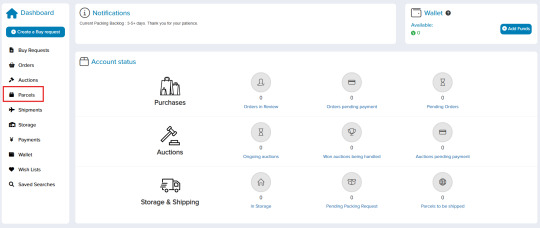
Neokyo will send you emails with every update so you don't need to worry.
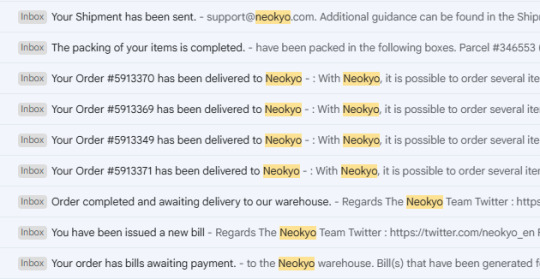
Please watch this helpful Youtube video if you're still confused.
Happy buying! Also, please do your research and be mindful of how much the shipping could cost you. He's a pretty big boy, so your box will be big too!
254 notes
·
View notes
Text


Naruto calling Sasuke a ikemen イケメン which basically means a hot guy; good -looking guy; 'cool guy' as in a pretty or attractive guy. Naruto never fails to compliment Sasuke's looks, as well as his skills (lol).
It's a slang shorthand for イケテル面, where; イケテル => another slang for "cool", 面 => another slangish way to say "face". In addition to that, they crossed the word 面 (pronounced as men) with English word "men" to specifically imply to a male person. "イケてる面", something like "The face being in" or something like that.
Etymology: IKEteru(good-looking, cool) + MENs(Japanese English for man/men)
The term イケメン mainly refer to the beauty of a man's face, but I think it also represents a well-formed face that may be masculine, feminine, or androgynous. And recently, Japanese people also say イケメン to kind and nice guy sometimes.
e. g: あなたの日本語、イケメンやなぁ
Romaji: anata no nihongo, ikemen ya nā
Complimenting the person's Japanese by using イケメン " your japanese is good".
I didn't know there was an interesting history behind the term Ikemen, and it was used in the gay community🥲
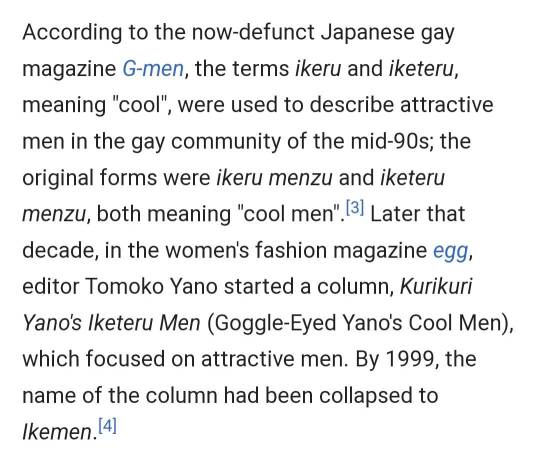
"G-men"- First published in 1995, ceased publication in 2016
It is not widely known that the word "ikemen" originated from gay people. It's well known that it became popular as a gyaru term around 2000 (Egg is a style magazine for Gyaru fashion), but it seems to have already been used in the gay community around 1990.
After that, the word ikemen became widely recognized and was included in the book "Gendaiyogo no Kisochishiki (Encyclopedia of Contemporary Words) ( Tokyo: Jiyukokuminsha, 1996 )" published in 2000. Furthermore, the word was included in the sixth edition of the Kōjien dictionary released in 2008 , indicating that it had become commonly used.
In 2009, topics related to "ikemen" became popular, and the word won the grand prize in the "ネット流行語大��= Internet Buzzword Awards" held by the video distribution service ニコニコ動画 = Niconico Video. One of the popular expressions that year was "*ただしイケメンに限る= Tadashi ikemen ni kagiru= Only if you are a cool handsome guy/ unless you are handsome/ Limited to a cute guy," which shows how widespread the concept of ikemen had become.
Nowadays, "ikemen" are not just about good looks, but are also discussed in various other ways. For example, "雰囲気イケメン = fuinki ikemen= handsome-vibe (guy)" refers to a man who is not necessarily handsome in appearance, but who is attractive due to his fashion sense and aura. On the other hand, there is also the expression "心がイケメン =Kokoro ga ikemen", It used to describe someone who is attractive because of their kind, caring, or good-hearted nature. This term emphasizes inner beauty and personality traits rather than outward appearance.
Many TV dramas have also aired with the theme of "Ikemen." In 2000, "Ike ike ikemen!!" started, followed by "For You in Full Blossom - Ikemen Paradise" in 2007.
Well, for the time being, it seems to be a word that has been used for the past 30 years or so, mainly from the Heisei era.
108 notes
·
View notes
Text
youtube
Revolutionize Your Podcast with Podcastle AI
Explore the transformative impact of generative AI in podcast creation with us! This video delves into how AI technologies are revolutionizing the industry by automating content creation, enhancing audio quality, and personalizing listener experiences. We’ll discuss tools like Podcastle's clip generator and revoice feature that streamline workflows for podcasters and content creators.
Discover advanced methods for improving production processes, from AI-driven transcription services to programmatic podcast advertising. These innovations not only enhance accessibility but also help monetize content effectively. Join us as we uncover these exciting developments in media production!

#GenerativeAI #PodcastCreation
#Podcastle#Generative#Aritificial Intelligence#AI#Neturbiz#Revolutionizing Podcasting#Content Creation#AI Integration#Media Production#Innovative Solutions#Tech-savvy Creators#Streamline Workflows#Content Quality#Advanced Methods#Audio Distribution#Revoice Utility#Clip Generator#Social Media Promotion#AI Video Editor#Transcription Services#Programmatic Advertising#Audio Enhancement#Background Noise Reduction#Content Creation Tools#innovations#Technologies#Youtube
0 notes
Text
These are just initial thoughts, and perhaps I’ll learn something that changes my mind on it, but I’m glad to see Critical Role making the leap to their own subscription service with Beacon.
As a lead in: I’m an attorney that has some background in IP law, though it isn’t what I practice currently. I’ve kept in contact with several active practitioners, particularly those that represent small-time creators either in their own independent practice or via nonprofits. I do not have an extensive Rolodex of IP peers, nor do I spend the money to keep up on IP CLEs. I’m just someone who used to know a ton because I did heavy research and work in that space, and that hasn’t been the case for years.
So here’s my thoughts a bit on the IP angle:
The primary reason I’m happy to see this leap is that CR is taking active steps to keep control over its IP. It’s a boring thing to most people, but when I start paying attention to a specific creator (authors, directors, companies, etc.), I tend to be very attentive to how they use their IP. How freely do they license their marks to partner with other creators to make merch? How often do they allow others to make adaptations or derivatives of their copyrights? What is the quality of those products? What is the supply chain like? Are those third parties objectionable in some way? Were the other parties faithful to the original works or marks? Was this a cash grab or an earnest effort to make something worth the price tag?
Honestly, I like how CR run their business. They have a history of tapping fans and fellow small businesses when making new merch or spinoffs. They embrace the culture of fan-made derivative works, both by featuring fanart/cosplay and by sharing their success. Do you know how rare it is for a company to pay fan artists for their already-made and freely posted work and then sell books of it? Let me be clear: CR bought a limited license from each artist so they could print and sell each work in a physical book, then paid the cost of publishing that book with no guarantee that CR would make that money back, let alone profit. I have a copy of the collector’s edition art books: they’re actually very well made and the packaging definitely cost a pretty penny. That’s not a rainmaker idea, that’s genuinely risking financial loss to sell something people could access for free if they wanted to.
The art books aren’t a one-off either. Darrington Press is CR’s separate LLC for tabletop games. (It’s good business practice to split off companies that handle products in different industries.) CR has also made shows based on those games, and the Candela Obscura series has quite a dedicated audience. Everything about Candela belongs to them: the game itself, the rule book, all the art in the book, the web series based on the game, and merch. It’s so successful that they invested in scheduling a live show for Candela later this month. That’s HUGE.
Contrast that with the distribution of Campaign 1 and the first 19 episodes of Campaign 2. CR cannot host those videos themselves; Geek & Sundry still exists and still holds what I presume to be distribution rights (but I don’t have the contract to review). So G&S gets to host those videos on YouTube and reaps the advertising. I can’t speak to whatever share CR gets from that, but considering that CR is locked out of hosting their own copies of those videos, I doubt it’s much, if any, revenue. (If you’re wondering why CR just didn’t buy those rights back, I ask: what incentive does G&S have to sell something that’s making them money for no cost?)
Knowing that background about G&S, I was wary of CR choosing Amazon to host and distribute The Legend of Vox Machina. Originally, TLOVM was not the plan; CR had a kickstarter for an animated special based on C1. It was only because they blew past the goal that CR was able to make an entire season. The reasonable assumption is that choosing Amazon had to have secured CR additional funding for future seasons of the show, which seems evident from how quickly season 2 was announced, Mighty Nein Animated is also going to be a thing, and that season 3 of TLVOM is scheduled for fall 2024. CR had the option of just doing 1 season and keeping it purely in their control, but going with Amazon meant they could animate more of their works. Animation is expensive. I cannot stress enough how doubtful I am that CR would have been able to afford this many episodes and both campaigns if they had not gone this route. As wary as I was in the start, it paid off, and it’s going well—so far. Hopefully CR doesn’t regret that decision if Amazon tries something sleazy. But, as before, we don’t have the contracts and can’t know how secure CR’s position is if any dispute came up.
CR also partnered with Dark Horse Comics to make Vox Machina comics and Might Nein Origins comics. What’s especially surprising is that each of the cast had a hand in writing the MNO comics for their characters, with Matt listed for multiple. That isn’t very common with comic adaptations. Often times, IP owners let comic companies go ham with minimal oversight. Being listed as one of the authors comes with IP rights that have to be negotiated. That means that Dark Horse had to talk with CR about whether that warrants more or less revenue going to which party in exchange for that—or, alternatively, whether the comic gets made at all. That’s a ballsy move. You think people can just demand to write the comics that a publishing company is going to pay to print? Pffft. CR wanted some creative control, and that is a big ask. However, Dark Horse still has the distribution rights, both digitally and for physical copies. You couldn’t buy the comics from CR until they came out with the library edition, a book bound compilation of 4/8 comics. But the publisher is still Dark Horse; CR is just allowed to sell the book directly from their own site as well.
Contrast that with the novels about CR characters. CR partnered with Penguin Random House to publish novels about Vex and Vax (Kith & Kin), Lucien (The Nine Eyes of Lucien), and Laudna (What Doesn’t Break). Liam and Laura were vocal about having some say in K&K, whereas Madeline Roux said in an interview that she had full control over TNEOL. Both of those novels were narrated with CR voices, but narrating a book doesn’t come with IP rights, it just brings in a paycheck. There’s a lot less IP control in there compared to the comics, but this isn’t abnormal for book publishing. To be blunt, I doubt PRH would have agreed to publish the novels if anyone from CR had been a co-author or had heavy oversight over the author or the editing. I don’t think PRH even considered that as an option. Either an author that has already managed to sell X number of copies or nothing. Creative control over a book a huge ask, asks come with reduced revenue, and switching to books from a web series is already a leap. The fact that Laura and Liam had any say is surprising, really.
That was a long meandering tour of what we’ve seen CR do with its IP. The reason I bring up each of these things is that navigating the way to protect an IP in this space is rife with challenges. Different types of IP warrant different strategies because of the cost involved in creating each medium and the challenges placed by industries that have already sprung up around them. Any time that a third party is tapped to create an IP, it’s usually because they already have the funds and resources to create the work, and CR has to negotiate for revenue, creative control, distribution, and—the big one—who gets to be the owner. These are not easy, quick, or fun conversations, and CR is always going to be the smaller company at the table.
Knowing that, I’m not surprised or worried that CR is creating its own independent subscription service with Beacon. It tells me that they’re being careful with their IP whenever they can. A subscription service means they don’t have to trade away distribution rights or give up ad revenue to a third party. They’re in this for a long term investment, and that requires solid income not tied to third parties that can definitely outspend them in litigation in the event of a dispute. A subscription for bonus content is one of many parts in a diverse revenue stream.
(All that said, this isn’t meant to criticize creators that cant afford to do this type of thing. It took 9 years for CR to get to the point where Beacon is financially feasible and a desirable business decision. They have enough ongoing, popular content to warrant paying for a subscription, and they’ve built sufficient trust with their audience that more will be added. That takes time and an awful lot of money.)
As a final note, I take this step as a sign that CR definitely intends to stick around. This isn’t a move people make when they plan on ending the business after the current campaign. I’m glad to see CR is taking steps to secure their foundation and keep making new content.
I’m sure people will chime in on other issues (cost, content exclusivity, etc.), but I hope my perspective gives an idea of why this sort of thing is good for business generally and why it would be good for CR.
#critical role#beacon.tv#don’t trust me I’m a lawyer#I’m not your lawyer#I’m not CR’s lawyer#none of you paid me for shit#I do what I want
213 notes
·
View notes
Text
Did anyone else get a gross, slimy feeling when watching the bathroom scene in Confrontation where Marinette and Sabrina revealed how the mirror was actually a two way mirror allowing anyone to see inside, or how there were microphones recording everything happening inside?
Or how Marinette admitted to making the usual bathroom "out-of-service" so she could tamper with the temporary bathroom? Granted, we never see inside the potentially vandalized bathroom, only her putting up the sign, though if the school needed to build the temporary bathroom, there's enough evidence in the episode to suggest Marinette caused serious damage in order to carry out her plan.
Out of morbid curiosity, I searched up the prison sentence for recording in a public bathroom and found this from "prisonguide.co.uk". Before anyone comments, I know the UK and Paris are different places with different laws, this is just to show how scummy the whole scheme was from my perspective.
Warning, slight mention of voyeurism ahead. Nothing major but I'll warn you just in case.
Typical Sentences for Voyeurism Offences
Generally, offenders may face up to two years in prison. However, sentences can be more severe if the offence is aggravated by factors such as the victim being a minor or if the act involved recording and distributing images or videos.
Reading this over, I don't understand why the writers made the Main Character of a show aimed at children commit a crime this serious and damaging, and ultimately be rewarded by the narrative. Remember, this is how she defeats Lila, with Chloe following a few episodes later.
It's appalling how this made it past the drawing board. I know the writers wanted Marinette to expose Lila to everyone in an "epic, you go queen, girlboss" way, but did they have to choose such a scummy method of doing so?
Also, isn't Sabrina the daughter of a Police Officer? Shouldn't she know recording someone in the bathroom -a place where privacy is expected - is a crime?
#mlb#miraculous ladybug#mlb salt#miraculous ladybug salt#ml writing salt#ml writers salt#marinette salt#sabrina raincomprix salt#how does anyone trust her after seeing how far she'd go to get back at someone she doesn't like
54 notes
·
View notes
Text
All or Nothing and lowave records
Strap in because this is gonna be a long one. This post will try to shed some light on how the whole lowave records thing works, how you can use this music, how it is being distributed, and what all a contract with lowave would include. All this and more below the cut!
Let us start with the basics: What is lowave records?
Quite succinctly summed up on their website as follows:
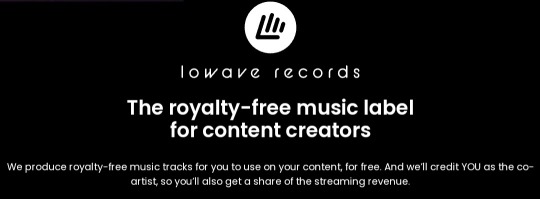
They make and distribute royalty-free music for content creators - specifically video-format content creators like Youtubers and streamers - they share some streaming revenue (30%, we'll get into that) with the creators who are labelled 'co-artists' and get promotion of their music through the content creators.
So, that brings us to the next big question: What is royalty-free music?
This is music that is free to use. Yes, by anyone, by Dan and Phil, by other creators, by you and me, any of us. This is by no means a new thing of course, anyone who has created content online would have come across other such services. just as an example, bensound.com hosts a large library of royalty-free music which you can use in any video by simply crediting the site in your description. Lowave works in a similar fashion. The music is not copyrighted. However, the rights to the music are held by lowave records and there are limitations on its use, which we will get into ahead.
How is the money working (preliminary edition)?
I will add details to this later when I discuss the contract, but let's see the info we get straight away from the FAQs: You do not have to pay them anything to make music for you

The money is coming in from the streaming platforms, depends completely on amount of streams, and is shared between lowave and the creators


Also from the FAQs: how can this music be used?
Anyone can freely use any of the music from lowave records, which means that yes, you can use any music from All or Nothing for your purposes with credit, it will not be taken down


Is this the only music we will hear on dapg now? Will there be more albums?
Not necessarily! This isn't an exclusive deal, DnP can use any music they want on the channel. As for new albums, seems like it depends on how this one does (and it seems to be doing quite well!) which will unlock future avenues for more collabs with lowave


Okay BASICS DONE if you're still reading you're probably here for the real meat so let us get into it
How is the money working (director's cut)?
Let us start with the terms on the partner agreement:
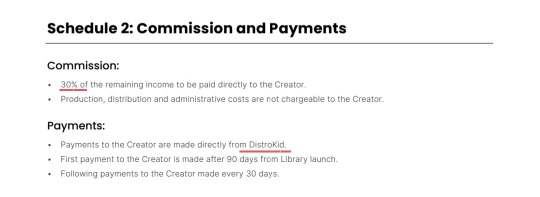
Content Creators get 30% of the 'remaining income'. This basically means any costs that streaming platforms are deducting, any processing fees, taxes etc will be deducted before the 30% share is calculated. The second point there basically means that the deductions here do not include business expenses of the label itself, ie when the label calculates its own profit production costs and various other expenses are deducted from the income, but these costs will not affect the revenue received by the content creators (You are probably already thinking 'how is this company earning enough to keep going?' and I will touch on that later as well)
Payment installments are simple enough but here we see a third party enter the chat: DistroKid. Who is DistroKid and why are payments going through them, Hazel? I hear you ask. Well I'll tell you dear readers:
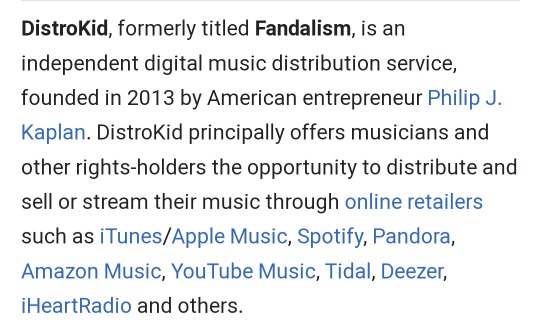
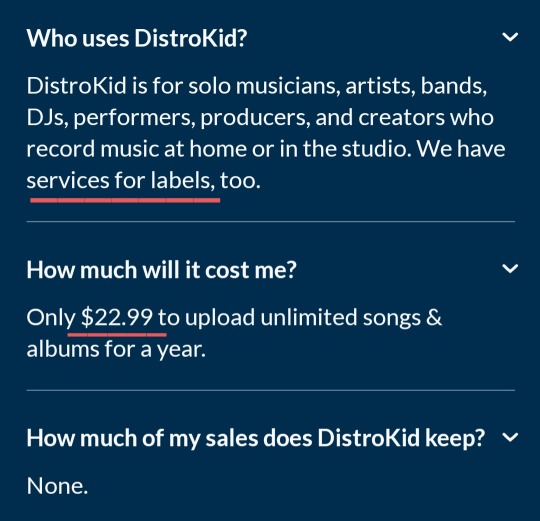
It is basically a service that takes a yearly fee for putting your music on streaming platforms efficiently and then pockets 0% of the royalties. The royalties go from the streaming services (eg Spotify) to DistroKid who then send it to the rights-holders (in this case, lowave records). lowave records is using this service for a yearly fee to upload all their music through.
But wait! If DistroKid is working with lowave, and lowave owns all the rights, why is DistroKid making direct payments to the content creators?
Well, over the years they have offered a bunch of services:
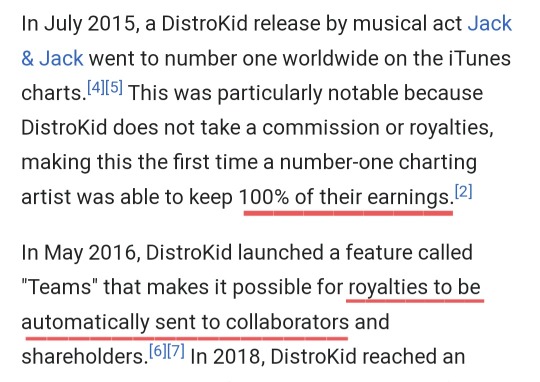
I am guessing lowave is making use of the teams feature to send royalties owed to content creators ("collaborators") directly from Diskworld, which makes sense, the less people money goes through the less chances of mishandling.
People have of course been talking about what percentage Spotify even pays for many many years. The short answer: we don't know for sure because it is confidential, Spotify won't tell and artists aren't allowed to. The longer answer: people have estimated from a bunch of publically available data that the share seems to be 70-30 (rights-holders- spotify).
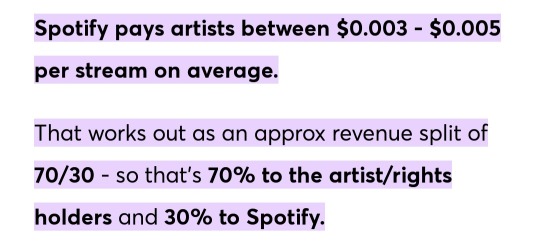
However spotify is not paying per stream anymore so that makes these figures harder to pin down. they are using a 'streamshare' system which is much more convoluted:
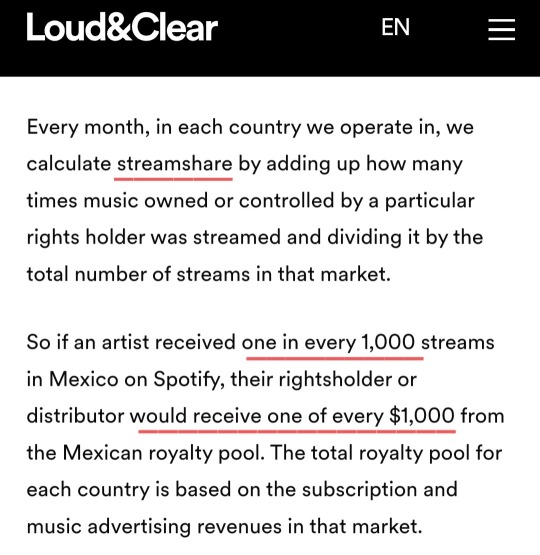
That was all about the money, now let's talk Licensing
Creators can use this music in any capacity, and do not have to share any of the revenue from their own content with lowave. They have put a stipulation that it may not be used in a way that is "illegal, immoral, discriminatory or derogatory to [lowave]" but what constitutes 'immoral' and 'discriminatory' is not really defined.
The other limitation applies to the contracted Content Creators only as far as I can tell: they are not allowed to remix, sample, or edit these songs without prior permission. This probably only applies to altering the songs and playing under the same name, so fan remixes should not run into issues here, as long as they are not monetised. (thanks kate @goldenpinof for making me think about this part a bit more, I think it should be safe, but even royalty free music cannot be transformed without permission at least in a commercial capacity)
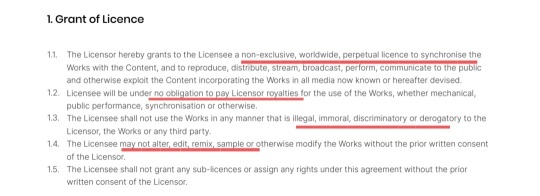
They will also make more music free of cost if the streaming targets they set are being met by the albums produced. The process:

Other services they provide will be handling the creator's account which they set up (DanAndPhilBeats in this case) on streaming platforms and making changes as required, so the Cheeky Banter -> Project X thing was probably done from their end, possibly an older change that they forgot to update?
Also below are promotional obligations:
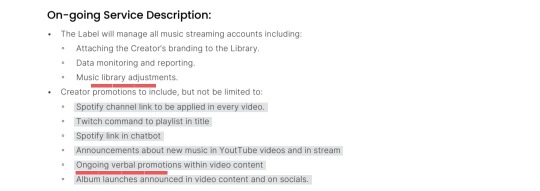
The promotion wasn't a one-time thing, it is expected to be ongoing, so we will probably be hearing about this in future videos as well. However, later in the partner agreement it is added that this has to be done as often as possible in a way that is "natural and appealing to their audience" which again, is pretty vague wording

Also the licensing goes both ways, so lowave can also use segments of the content DnP make that has the music in the background to promote their music:

Additional stuff from the contract:
lowave takes the guarantee of creating original works that it has the rights to and which do not infringe on copyrights, and the creators likewise take the guarantee not use the songs in content which infringes copyright. If there are any disputes regarding such infringement in the future the record and the creators have to back each other up (including sharing legal fees)

I mentioned before some parts of the agreement being written in vague language. There is also a clause that says if any provision ends up being illegal/not possible to enforce by a court (eg if a court were to it's impossible to say whether content featuring the songs was 'immoral') then only that provision will be removed, the rest of the contract stands.
The waiver part basically means that if any of the parties decide to not sue or forgo a complaint about breach of contract, that does not mean that those provisions are now unavailable, they can still sue later on or for some other breach if they wish.

That's the contracts done. Some of the framing there makes it seem to me like it's a pretty small company. The revenue they hope to generate does not seem to be very sustainable, especially since the revenue is being shared with content creators but the cost is not and they are additionally paying for other services like DistroKid.
So I looked more into this record label: they started business in 2022. If you go to their socials though, twitter and instagram they have followers in double digits and post very sparsely. Their tiktok seems to have nothing on it at all (thanks @lesbiandanhowell for the screenshot) and you may have noticed, Dan did not tag the lowave account at all when he announced the album on twitter

The agreement never mentions creators promoting lowave's social channels or tagging them either (and it is quite odd, I have worked with a bunch of organisations in their infancy and this is, now more than ever, a common requirement from collaborators). lowave records does not seem to be actively working towards promoting themselves on social media or building an online presence, even though they have been operational two years producing music throughout.
There are three people involved with the company on public record:
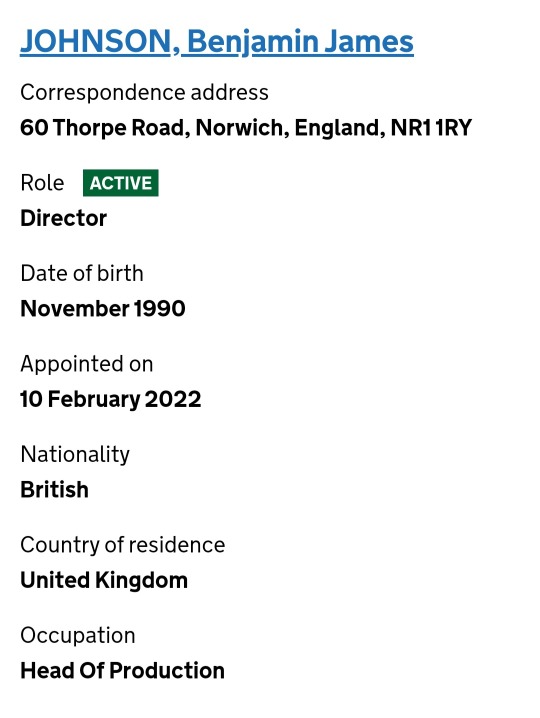
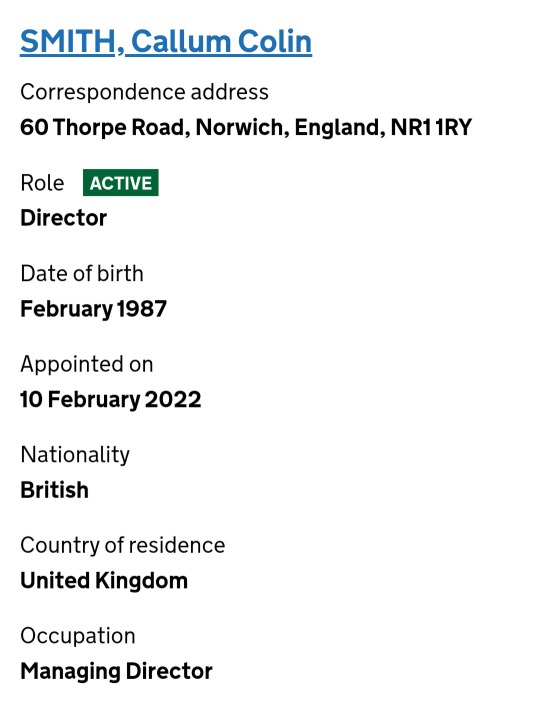
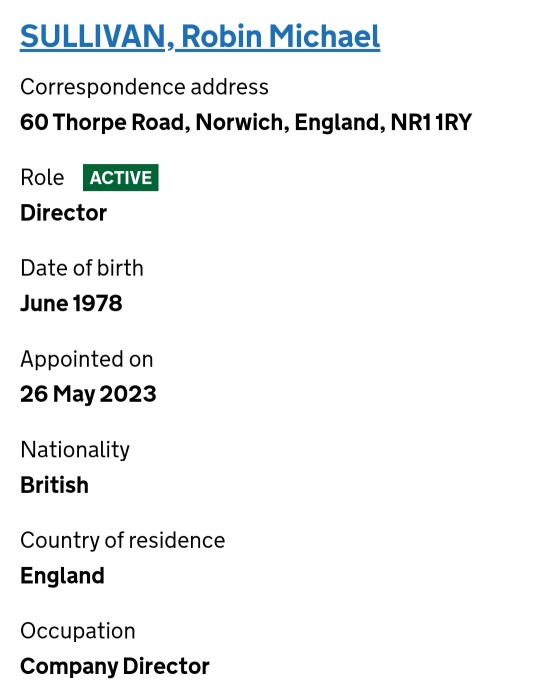
Benjamin Johnson listed as 'Head of Production' is probably the 'Ben' Dan has been talking about who made the songs. Seems like their scale of operations is not very big and possibly not a lot of producers in the records at all (despite the spotify page saying they have 'producers' plural, but that doesn't have to mean a lot many lol). Anyway, that would solve the mystery of 'how are they playing their employees?' if there aren't many employees to begin with (not even an intern to manage their social media it seems).
Look at the last person in the screenshots though: Robin. I looked at what other companies Robin is associated with and several of them - yeah several different operations that he's involved in - have the same correspondence address of '60 Thorpe Road...', so probably operating out of a ghost office (just to have a registered address and receive mail at etc). And one of these businesses that Robin is associated with is RWD, the business that made lowave records' website for them:
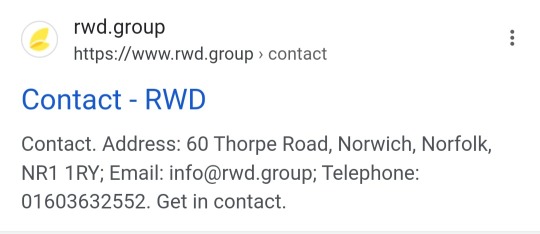
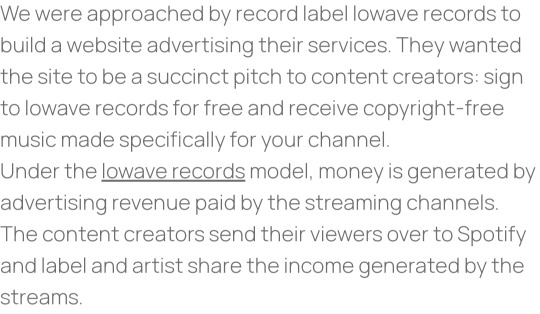
The no-cost production of royalty-free music, little attention to social media presence, vaguely written contract, seemingly small scale of operations with technical assistance like website design coming from an affiliated organisation makes me think that lowave records might be a side project. A labour of love, possibly, hoping to sustain itself enough to keep putting out royalty-free music in a time of extreme crackdown on copyrighted music use.
It makes sense to use content creators for promotion, gets you way more streaming than making your own music and putting it out. And the incentive of unique but guaranteed royalty free music at no cost is great for content creators of all sizes. It is far from sustainable on its own though, especially with streaming revenue being basically peanuts, and I do not think there's much interest in gaining a following or putting in that effort either, so it's probably a very small business by a few people. How long it manages to sustain itself as a project I am not sure, but it certainly isn't looking like something particularly geared towards profit and growth in its current state.

We are at an end! If you read this far, leave me like an A+ or a star for my essay so I can have academic validation from this please. Of course I probably have not covered everything possible in connection to this so if anyone has more info feel free to add on! And if this was all very long and there's something particular you wanted to know you can drop an ask into the inbox about it!
Thank you for coming with me on this journey! Back to the important things, which was your favourite song from the album? I think mine is Arcade Admission
#dnp#dan and phil#dnpgames#dan and phil games#meta#?#all or nothing#lowave records#dan howell#phil lester
261 notes
·
View notes
Text
True Love?
They lack of wayne mccullough fic
Pairings - Wayne Mccullough x Reader.
Warnings - Out of character, grammatical errors
You guys met after your professor pick him as your partner for project since he knows that wayne needs a help with his grades.
Although he don't listen to no one he is surprisingly interested to you talk about the topic you guys are about to do.
After the project he has this feeling that he is longing for something, he didn't really know it at first until he asked orlando about it since he knows that orlando knows everything about feelings.
Once he knew that he is inlove with you he didn't hesitate to improve himself, he knew that he needs changes before taking the risk of asking you out.
At first you are hesitant to take the gifts he gives you especially when it's in a box, you think that it's the hammer he always bring to school.
After the few months of gifting, doing act of service, writing letters, improving his word of affirmation, doing well in his life, you finally answered his question on asking you out for a date.
It took a very long time getting ready for your first date, he take you out for a nice dinner after that he take you out for carnival and riding a ferris-wheel while admiring your beauty shining because of the lights.
Making the first date memorable is doing the first kiss when the ferris wheel finally got to the top. Trust me everytime he walks past the carnival he always remember that moment.
While walking back home you are wearing his jacket since it got so cold, he even carried you until you guys arrived home because you told him that your feet hurts from walking in heels while biting the fresh flower he bought for you earlier. (this scene is based on that one tiktok video i found probably last year)
After all that he just focused on his school works even avoiding the people he used to fought with.
With his parents he stopped caring about them since they give him that energy since he was a kid, he had the comfort of having a parent when he met you parent for the first time. They already knew about his past but they want to give him the chance and welcomed him.
He loves pets but he thinks he can't keep them for too long and they'll just die when he try taking care of one, although he is afraid to take care of one he still get the kitten he see at the street. Bro got gifted by the cat distribution system.
Once he got comfortable complimenting you, he can never stop, seeing you in new outfit? Gorgeous do a pose!😛
Speaking of pose he loves to take polaroid pictures with you and put it in his phone case, it's like a reminder for him that he is a changed man when someone is testing him.
#wayne x reader#Wayne#wayne mccullough#wayne mccullough x reader#mark mckenna#Mark mckenna x reader#Spotify
401 notes
·
View notes